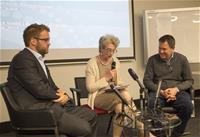
Public health and healthcare professionals can have a major impact in addressing climate action, say some of Australia’s leading physicians.
During a seminar hosted by the Royal Australasian College of Physicians (RACP), physicians Dr Nick Watts and Professor Tony Capon talked about the need to develop environmentally sustainable healthcare in Australia.
“Global warming poses an immediate and local threat to human health across the world, with no country immune,” Dr Watts said. “By responding to climate change, we can unlock unprecedented gains for public health, cleaning up our air, encouraging healthy diets, and building more liveable cities.
“The health profession's response to the 2015 Paris Climate Agreement has been led by organisations like the RACP and The Lancet - advocating for the public's health just as we did with tobacco and HIV.”
In 2009, the University College of London and the Lancet Commission jointly launched a
ground-breaking report delineating the human health effects of climate change.
The Lancet Commission released its
second major report in 2015 which builds upon the issues raised in the first report. According to Professor Capon, the healthcare sector needs to take responsibility for its share of carbon emissions.
“Total health expenditure in Australia accounts for about 10% of gross domestic product and this represents a big chunk of our nation’s carbon emissions,” Prof Capon said. “There is a pressing need for doctors and other health professionals to reduce the environmental impact of health services.”
RACP President Dr Catherine Yelland said the impact of climate change on human health was evident and doctors have an important role to play in addressing the problem.
“More and more people are succumbing to diseases attributable to poor air quality and nutrition. Many doctors are concerned about health impacts of climate change, and can see the impact of extreme weather events materialising in higher morbidity rates,” Dr Yelland said.
“The health sector needs to consider ways it can combat climate change and what we can do to deliver sustainable healthcare.”
In January last year, National Health Service (NHS) England released the
Sustainable Development in Health and Care Report which showed the NHS reduced its carbon emissions by 11% during 2007-2015 exceeding the 10% target set in 2009. This was achieved despite an 18% increase of healthcare activity.
“The UK experience shows it’s possible for the health sector to reduce its carbon footprint, and develop sustainable models of care. We should follow the lead of the UK and ensure that the health sector is ready for the future.”
Dr Watts is the Executive Director of the Lancet Countdown: Tracking Progress on Health and Climate Change, and the Director of the UK Health Alliance on Climate Change, a coalition of leading UK health and medical organisations, including the British Medical Association, The Lancet, and the UK Royal Colleges of Physicians.
Dr Capon is a public health physician, the inaugural Professor of Planetary Health at the University of Sydney, and a member of the Rockefeller Foundation–Lancet Commission on Planetary Health.